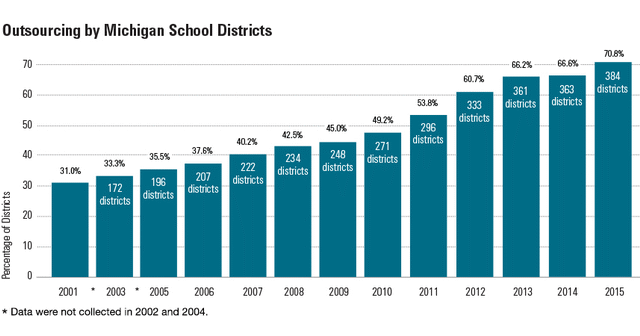

By
Click here to find the full results from our 2015 school privatization survey.
There are more Michigan public schools contracting out food, custodial or transportation services than ever, according to the Mackinac Center’s latest survey of school districts. This year, 70.8 percent of school districts use private-sector vendors to clean buildings, get kids to school, or cook and serve school meals. This is up from 66.6 percent the previous year.
Getting more of the private sector involved in a supporting role in school districts is a long-term trend. In 2001, only 31 percent of districts contracted out these services and it took a decade before more than half of districts contracted out.
Our survey was performed between May 18, 2015, and August 4, 2015, and received responses from every Michigan school district for whether it used private-sector vendors to provide food, custodial or transportation services.
The biggest change has been in custodial services. Our 2003 survey found only 34 districts contracted out this service. In 2015, 283 of Michigan’s 542 districts contracted out these services.
School food services are highly-regulated enterprises and the federal government subsidizes meals for many children. There are a few companies that have specialized in helping districts provide this service. In 2003, 27.3 percent of districts contracted out these services. This proportion increased to 42.8 percent in 2015.
But it is not exclusively large firms that offer their services to districts. For instance, the Dalwhinnie Bakery and Deli on Beaver Island provides food services to students at the Beaver Island Community School.
There is a growing number of school districts that use private-sector contractors to bus students to and from schools. There were 18 districts that began new transportation contracts between the 2014 survey and the 2015 survey and now 144 of Michigan’s 542 districts (26.6 percent) contract out this service.
In addition to specialized knowledge and experience of vendors, there are other considerations regarding the contracting of services such as increased economies of scale in purchasing and tested management techniques that can help districts save money. Unfortunately, the underfunding of the school pension system weighs the cost-benefit calculations in favor of private-sector provision of services.
Schools are required to send between 28 and 33 percent of payroll to Lansing to cover the costs of retirement benefits. The bulk of these payments goes to paying down unfunded liabilities in the system. When a district contracts out employees, their retirement benefits tend to cost between 5 and 7 percent of payroll, resulting in substantial savings from contracting out, regardless of any other changes.
The growth of private-sector vendors providing their services to school districts allows school officials to spend more of their resources on educating students. Our survey shows that contracting out for support services has continued to increase over time.
The full results from our 2015 school privatization survey that includes data from Georgia, Michigan, Ohio, Pennsylvania and Texas can be found here.
Permission to reprint this blog post in whole or in part is hereby granted, provided that the author (or authors) and the Mackinac Center for Public Policy are properly cited.
Get insightful commentary and the most reliable research on Michigan issues sent straight to your inbox.


The Mackinac Center for Public Policy is a nonprofit research and educational institute that advances the principles of free markets and limited government. Through our research and education programs, we challenge government overreach and advocate for a free-market approach to public policy that frees people to realize their potential and dreams.
Please consider contributing to our work to advance a freer and more prosperous state.

Donate | About | Blog | Pressroom | Publications | Careers | Site Map | Email Signup | Contact